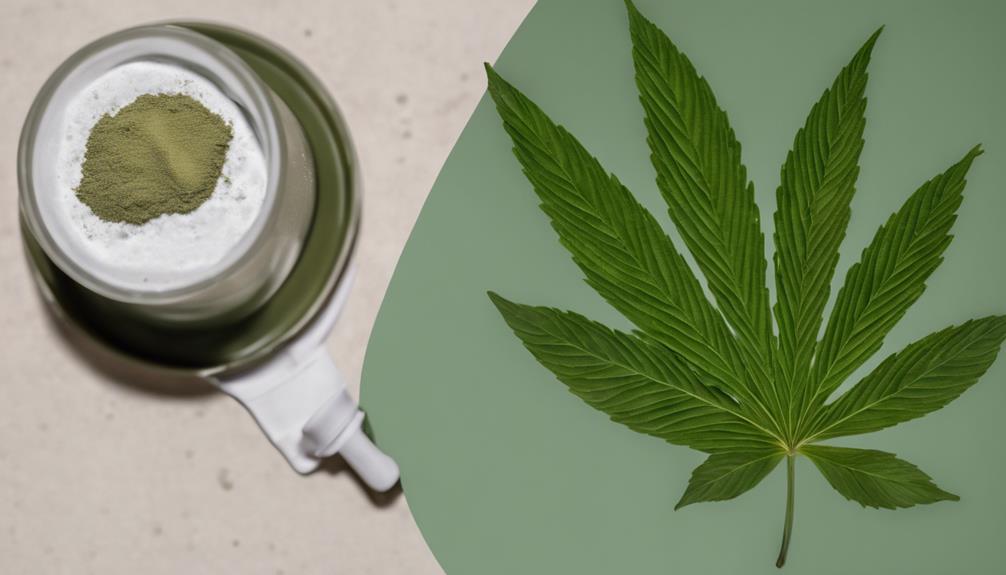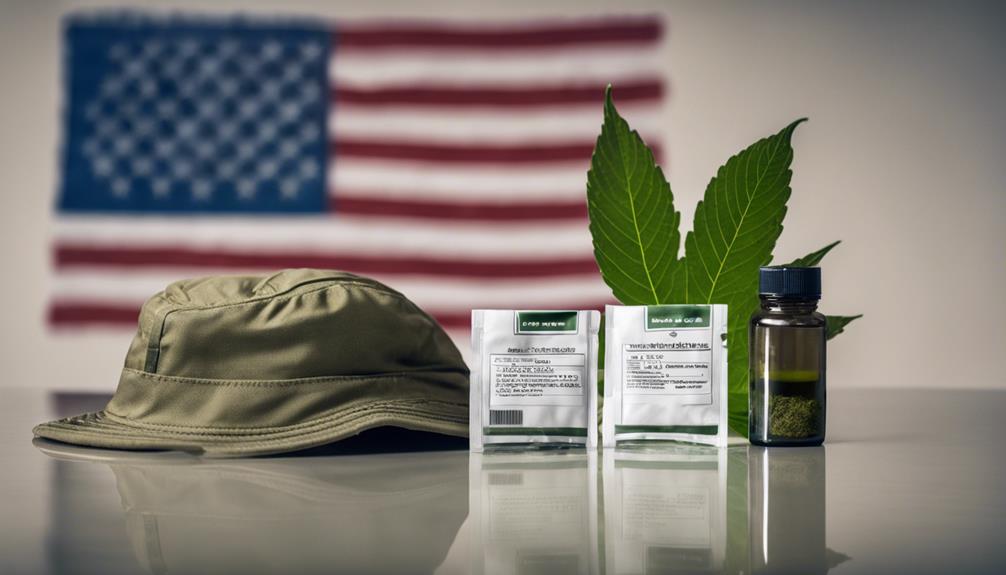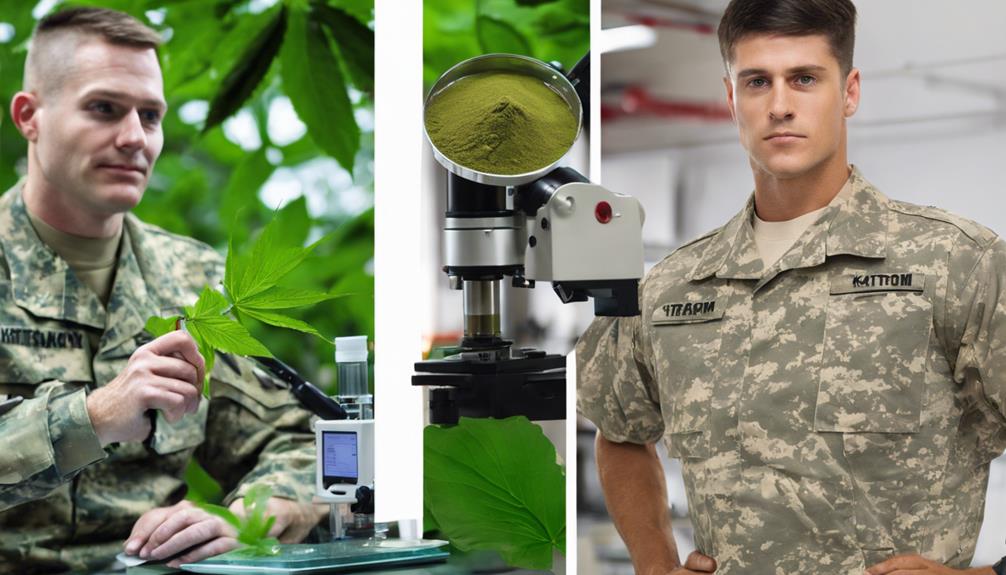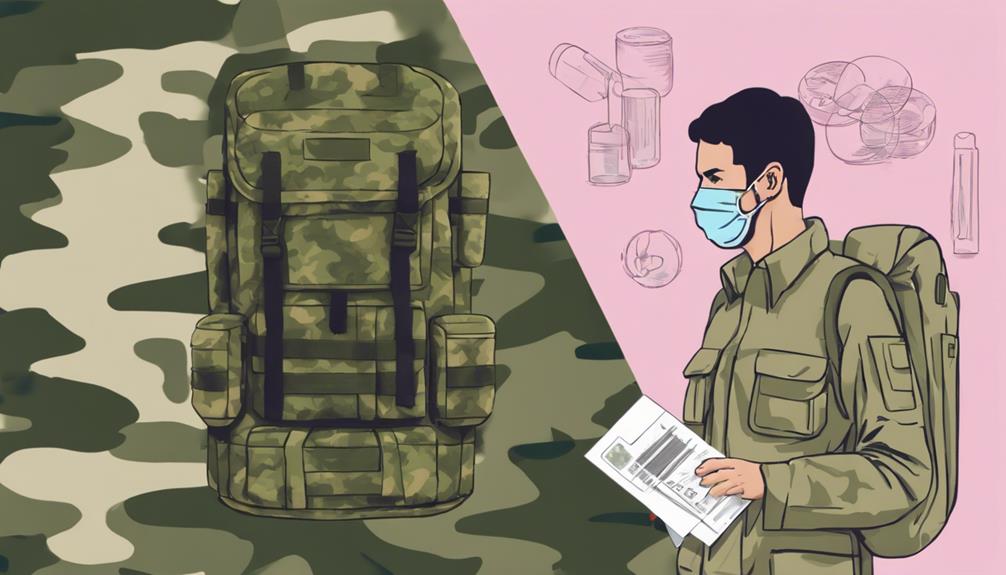Deprecated: mb_convert_encoding(): Handling HTML entities via mbstring is deprecated; use htmlspecialchars, htmlentities, or mb_encode_numericentity/mb_decode_numericentity instead in /home/users/kratomfiles/www/kratomfiles.com/wp-content/plugins/quick-adsense-reloaded/includes/template-functions.php on line 3552
As a military service member, you're strictly prohibited from consuming kratom, a substance explicitly banned by the Department of Defense, and its detection can lead to prosecution and disciplinary action. GC/MS and LC-MS/MS tests can detect kratom up to 5 days after consumption, and hair follicle tests can detect it up to 90 days after. False positives are a risk, and specialized tests are needed to confirm a positive result. The military takes a strict stance on prohibited substances, and kratom is no exception. The consequences of kratom use are severe, and it's essential to understand the risks – there's more to the story.
Key Takeaways
- The military strictly prohibits kratom use, and its consumption can lead to prosecution and disciplinary action.
- Kratom is not detectable in standard urine drug tests, but specialized tests like GC/MS can detect it up to 5 days after consumption.
- The military can request a drug test at any time, and kratom can be detected in urine, blood, hair, and saliva tests.
- False positives can occur with standard urine drug tests, and specialized tests like GC/MS may be necessary to confirm a positive result.
- The frequency of kratom testing is unpredictable, and the military takes a strict stance on prohibited substances, including kratom.
Kratom and Military Policy

As a member of the armed forces, you should be aware that kratom consumption is strictly off-limits, and the Department of Defense has explicitly banned its use while serving in the military. This prohibition is in place to safeguard that military personnel avoid the risks associated with kratom, including the potential for drug dependency and the possibility of venturing into other drugs on the controlled substance list.
Make no mistake – kratom is a prohibited substance in the military. If you're caught with it, you risk prosecution. The military's drug policy is more permissive than civilian law, but kratom is not allowed. In fact, the use of kratom by military personnel was outlawed in 2014, and FDA approval is needed before the military would consider using kratom. The United States Air Force and Navy have also explicitly prohibited the use of kratom.
As a military personnel, it is vital to understand that kratom is not currently permitted in the military. The Department of Defense takes a strict stance on kratom use, and it is imperative to comply with this policy to avoid any consequences. Remember, kratom is an opioid-like substance that can lead to dependency, and its use is strictly prohibited in the military.
Detection Methods for Kratom
As you explore the detection methods for kratom, you'll encounter several techniques that can identify the presence of this substance in your system. Specifically, you'll want to understand the roles of gas chromatography tests, immunoassay screenings, and LC-MS methods in detecting kratom compounds. By grasping these methods, you'll gain a deeper understanding of how kratom use can be identified and measured.
Gas Chromatography Tests
When you're tested for kratom use, Gas Chromatography/Mass Spectrometry (GC/MS) is a highly sensitive and specific method that can detect kratom alkaloids, particularly mitragynine and 7-hydroxymitragynine, in biological samples such as urine, blood, and hair. This method is reliable, as it can detect kratom use up to 5 days after consumption, making it an ideal choice for detecting kratom use in military personnel.
Here's a breakdown of the GC/MS method:
| Detection Limit | Biological Sample | Detection Timeframe |
|---|---|---|
| 1-10 ng/mL | Urine samples | Up to 5 days |
| 1-10 ng/mL | Blood samples | Up to 5 days |
| 1-10 ng/mL | Hair samples | Up to 5 days |
| 1-10 ng/mL | Urine, blood, and hair | Up to 5 days |
GC/MS testing involves extracting kratom alkaloids from biological samples, separating them using gas chromatography, and detecting them using mass spectrometry. This allows for accurate identification and quantitation of the compounds. With detection limits of 1-10 ng/mL, GC/MS is a highly sensitive method for detecting kratom use, making it the gold standard for detecting kratom use in military personnel.
Immunoassay Screenings Used
You may be surprised to learn that immunoassay screenings, a common method used in drug testing, are ineffective in detecting kratom due to its unique chemical structure. As a result, using any product containing kratom, a controlled substance derived from the Southeast Asian tree, will not produce a positive result in a routine DoD drug test. This is because immunoassay screenings, such as Enzyme-Linked Immunosorbent Assay (ELISA) tests, are not sensitive enough to detect kratom and may produce false-negative results. In fact, kratom's chemical structure is so distinct that it may even cause a False Positive for Opiates. This is particularly concerning for military personnel, as a false positive could lead to unnecessary consequences. In contrast, a urine test using a more advanced method, such as Liquid Chromatography-Tandem Mass Spectrometry (LC-MS/MS), would be a more reliable military test for kratom. It is crucial to understand the limitations of immunoassay screenings when it comes to detecting kratom.
LC-MS Methods Employed
In the pursuit of accurate kratom detection, advanced methods like liquid chromatography-mass spectrometry (LC-MS) have emerged as a reliable means of identifying kratom alkaloids in biological samples. As you venture into the world of kratom detection, you'll find that LC-MS methods, particularly liquid chromatography-high-resolution mass spectrometry (LC-HRMS), are highly effective in detecting kratom alkaloids like mitragynine, speciogynine, speciociliatine, and mitraciliatine. These methods allow for precise identification and quantitation of kratom compounds, even in complex biological matrices. Urine tests, for instance, can detect kratom use up to five days after consumption, while blood tests can determine the amount of kratom consumed, although the latter is rarely used due to its complexity. If necessary, gas chromatography/mass spectrometry (GC/MS) testing can be employed to confirm the presence of kratom alkaloids in a sample. In the military, where drug testing is essential, LC-MS methods play a pivotal role in detecting kratom use and maintaining a drug-free environment.
Military Drug Testing for Kratom

Currently, military personnel are not routinely tested for kratom as part of standard drug screening procedures, but it's possible for them to be tested for it as part of a more thorough drug screening. This is because kratom's opioid-like chemical, Mitragyna speciosa, doesn't show up in standard five-panel drug tests like SAMHSA-5 or NIDA. However, specialized tests can detect mitragynine, a kratom alkaloid, up to 6 hours after heavy usage.
Here are some key points to keep in mind:
- Kratom is prohibited in the military, and its use is strictly prohibited by the United States Air Force and Navy.
- Military drug policy is more permissive than civilian law, but kratom use is still not allowed.
- Risks to health and well-being are associated with kratom use, which is why it's been added to the Operation Supplement Safety list of prohibited substances.
- Disciplinary action may result if you fail to comply with the prohibition on kratom use.
False Positives and Risks
One major concern with kratom use is that it can produce false-positive results on drug tests, which can lead to serious consequences for military personnel. You might think you're in the clear, but kratom's metabolites can cross-react with antibodies used in testing, leading to incorrect results. This false-positive result can trigger a chain of events, including disciplinary action, including court-martial, as kratom is considered a prohibited substance by the Department of Defense.
Moreover, kratom's opioid-like effects can lead to addiction, and its use has been linked to cases of neonatal abstinence syndrome. The lack of regulation and quality control in kratom products increases the risk of contamination, adulteration, and unpredictable effects. As a military personnel, you should be aware of these risks and the potential consequences of using kratom. You must prioritize your health and career by avoiding kratom use altogether. Remember, the Department of Defense takes a strict stance on prohibited substances, and kratom is no exception.
Is Kratom Safe for Military Use

As you explore the topic of kratom use in a military context, you'll need to examine the strict policies in place. You should be aware that the Department of Defense has banned kratom due to concerns about its potential impact on military readiness and performance. Now, let's examine the details of military drug policies, kratom detection times, and the risk of false positives to understand the implications of kratom use for military personnel.
Military Drug Policies
In the military, where drug policies are more permissive than civilian laws, you're still strictly prohibited from consuming kratom, a substance deemed too risky for military personnel due to its potential for addiction and negative impact on military readiness.
The military's drug policy is clear: kratom is a prohibited substance.
- Kratom is banned: The Department of Defense has outlawed kratom use for all active-duty military personnel.
- No FDA approval: Kratom is not approved by the FDA, and its use is not considered safe for military personnel.
- Possession risks prosecution: If you're found with kratom, you may face prosecution and disciplinary action.
- Lack of regulation: Kratom products lack regulation and quality control, posing a significant risk to military personnel.
As a military personnel, you must understand the military's stance on kratom. The use of kratom is strictly prohibited, and its detection can lead to severe consequences, including a failed drug test.
Kratom Detection Times
You need to understand that kratom's detection times are a critical factor in determining whether it's safe for military use, given the strict prohibition on its consumption. As a military personnel, you must know that kratom can be detected in urine tests up to 5 days after consumption and in hair follicle tests up to 90 days after consumption. This means that even if you think you've flushed the substance out of your system, it can still be detectable. The military can test for kratom at any time, and if detected, it can lead to disciplinary action, including court-martial. Kratom's major alkaloids, such as mitragynine, can remain in your system for up to 9 days, making it detectable in drug tests during that time. Since there's no precise test for kratom, it's a significant risk for military personnel. Remember, kratom is strictly prohibited for active-duty military personnel, and the consequences of getting caught can be severe.
Risk of False Positives
Testing for kratom can lead to false positives, which poses a significant concern for military personnel, since a misidentified positive test result can have severe consequences, including disciplinary action. As a military personnel, you should be aware of the risks associated with kratom use, including the risk of false positives.
Key facts to bear in mind:
- False positives can happen: A standard urine drug test may not detect kratom, but it can still lead to a false-positive result.
- Specialized tests are needed: Kratom can be detected through specialized tests such as hair follicle screening, blood tests, and saliva samples.
- Gas Chromatography/Mass Spectrometry testing may be necessary: To confirm a positive test result, Gas Chromatography/Mass Spectrometry testing may be required to rule out false positives.
- Disciplinary action is possible: If you test positive for kratom, you may face disciplinary action, even if it's a false positive.
Will Kratom Show Up on a Military Drug Test?
Yes, kratom can show up on a military drug test. It’s crucial for members of the army to have accurate kratom army drug test information. It’s important to be aware of the potential consequences of using kratom, as it may lead to failed drug tests and subsequent disciplinary action in the military.
Kratom Testing Frequency and Protocol
As a military personnel, you should be aware that the frequency of kratom testing is unpredictable, and the military can request a drug test at any time, without prior notice. You're probably wondering how often you'll be tested, but the truth is, there's no set schedule. The military doesn't include kratom in routine drug testing, but they can detect it in urine, blood, hair, and saliva tests.
If you've consumed kratom, urine tests can detect it up to five days after consumption, while hair follicle screening can detect chemicals in your hair cells. Blood tests can determine if you've taken kratom and how much, but they're rarely used due to the lack of specific tests. Remember, kratom use is strictly prohibited for active-duty military personnel in the United States, and getting caught can have serious consequences. Don't take the risk – it's not worth it.
Frequently Asked Questions
Is Kratom Illegal in the Usmc?
As you wonder if kratom is illegal in the USMC, know that the Marine Corps strictly prohibits its use. The Military stance is clear: kratom is an illegal substance, and its use is considered a serious offense. Under USMC regulations, kratom falls under the category of drug abuse, and its possession can lead to prosecution. The Marine Corps prioritizes substance regulation to maintain military discipline and the health of its personnel.










